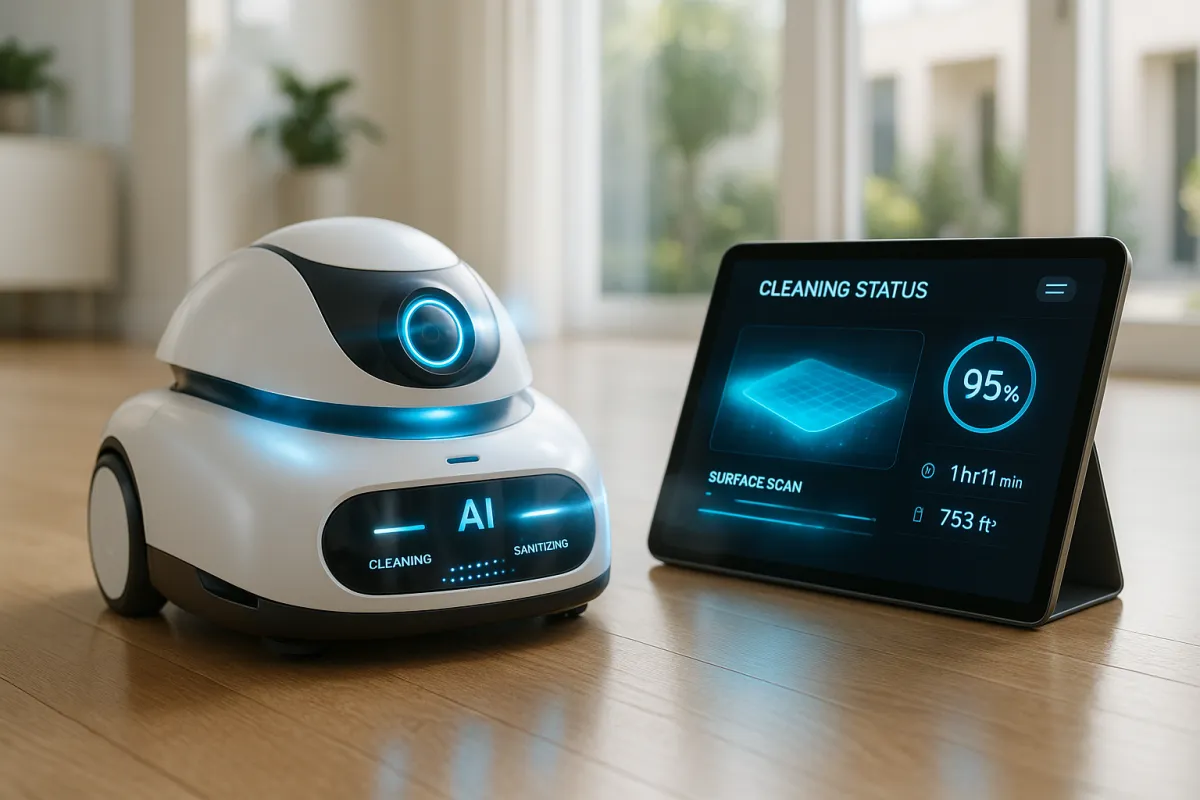
How AI Is Revolutionizing Cleaning in Wake County Homes
🧠 How AI Is Revolutionizing Cleaning: Smarter Homes, Healthier Spaces
On a quiet morning in Wake Forest, Maya poured her coffee and glanced around her kitchen. The sun streamed through spotless windows. The floors were free of yesterday’s dog tracks. The air smelled fresh — not because she had just finished cleaning, but because her home had already done the work while she slept.
The robot vacuum had mapped the high-traffic areas, focused on the kitchen and hallway, and docked itself with barely a sound. The smart air purifier kicked into high gear around 3 AM, when pollen levels peaked outside. And the moisture sensor in the guest bathroom had pinged her last night — just before a leaky faucet could turn into a mildew problem.
This wasn’t just luck or good habits. It was artificial intelligence, quietly managing the mess.
Across Wake County — in Raleigh townhomes, Cary condos, and Apex family houses — homeowners like Maya are tapping into AI tools that make cleaning less about elbow grease and more about smart decisions. And the shift is huge.
Ten years ago, cleaning meant juggling a cabinet full of supplies, setting aside half your Saturday, and constantly reacting to chaos. Today, cleaning is proactive, automated, and deeply personalized. Not because people are cleaning less — but because the systems around them are doing more.
Maya’s smart vacuum, for instance, isn’t just sweeping up crumbs. It’s learning her home’s layout, avoiding the dog’s water bowl, identifying which rooms get dirtiest, and adjusting its settings automatically. If the kids leave LEGOs on the rug, the vacuum doesn’t get stuck — it navigates around them with gentle precision.
The air inside her home is healthier too. With allergies being such a problem in Wake County — especially during Raleigh’s infamous spring — air quality matters. AI-powered air purifiers detect when pollen, dust, or pet dander levels rise and respond in real time. They don't just filter the air — they learn your habits, sense seasonal shifts, and work harder when your family needs it most.
In Cary, where tech-savvy homeowners are early adopters of smart living, integrated cleaning systems are becoming a staple. There are fridges that monitor spills and alert you to clean the shelves, sensors that detect bathroom humidity and suggest when to scrub tile, and apps that use AI to build customized cleaning schedules based on how often rooms are used.
The result? Less mess. Less stress. And fewer surprise chores on Sunday afternoon.
But it’s not all gadgets and gizmos. The real power of AI in cleaning lies in how it connects everything.
Let’s take Jordan and Luis — a couple in Apex with a baby, a golden retriever, and not a lot of free time. Their home system syncs their cleaning routines with their daily life. On days when they host playdates, their app recommends extra vacuuming in the living room and sanitizing high-touch surfaces. After outdoor walks, a sensor at the front door alerts them if the dog tracks in extra pollen or mud. The robot mop? It gets to work on cue.
Even their cleaning service is smarter. Based on foot traffic and air quality trends, their provider sends notifications when it’s time to schedule a deeper clean — something Val’s Cleaning Maids offers through flexible standard and Neat Freak packages tailored to each household.
In Wake County, these AI-driven habits aren’t a luxury anymore — they’re becoming the norm. Because clean doesn’t just mean tidy anymore. It means efficient. Healthy. Adaptive.
Consider the rise of “predictive cleaning” — where AI tracks data on usage patterns and environmental factors to suggest when and how to clean. Your system might notice that the guest bathroom hasn’t been used all week — and pause its cleaning routine there. Meanwhile, it flags the kitchen and entryway for extra attention after a rainy day or a birthday party.
It’s not just about convenience; it’s about outcomes. Families with asthma or allergies, elderly residents managing mobility issues, and busy parents juggling work and home life are all seeing the benefits of proactive, tech-supported cleaning.
And as the tools improve, the experience gets more seamless.
There are even AI platforms now that pair with voice assistants like Alexa or Google Home. You can say “Start kitchen clean-up,” and your robot mop and air purifier spring into action. Want reminders to wash sheets every Thursday or rotate pantry items once a month? Your system’s got it.
More Wake County homes are also opting for hybrid models — using smart tech for daily maintenance and relying on trusted local cleaning teams for deeper, scheduled services. It’s a perfect balance: let the machines handle the routine, and let the professionals handle the detail.
That’s exactly what Maya does. Her AI tools run in the background, keeping her space fresh. But once a month, she books a house cleaning session to reset everything. It’s peace of mind, built into the calendar.
At the heart of this shift is a simple truth: AI doesn’t just clean better. It thinks ahead. It adapts. And it frees people to focus on living — not scrubbing.
So the next time you walk into a home in Raleigh or Cary that smells fresh, feels open, and looks spotless, don’t be surprised if the reason is a little less elbow grease and a little more algorithm.
After all, in today’s world, smart homes aren’t just about lights and thermostats. They’re about clean, healthy spaces that take care of themselves — and the people who live in them.

